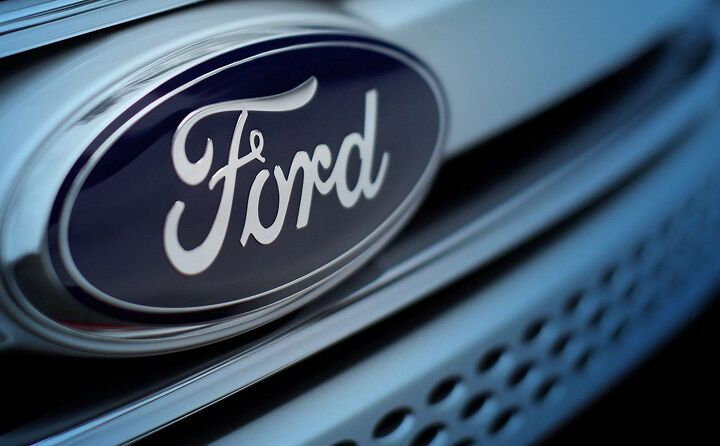Ford Likely to Eliminate 10 Percent of Global Workforce: Report

The Ford Motor Company is allegedly preparing for a sweeping reduction of its global workforce. Harder days for the auto industry have been a long time coming, but reports claim the impending layoffs are specifically related to shoring up finances and turning around the company’s lagging stock valuation — meaning Ford could be the canary in the coal mine or a lone company desperate to bolster its own profitability and get angry shareholders off its back.
While the automaker has not yet confirmed the cuts, there is every indication an announcement will be made soon. When confronted with the matter, representatives have been careful to make noncommittal statements and doubly cautious not to deny anything.
“We remain focused on the three strategic priorities that will create value and drive profitable growth, which include fortifying the profit pillars in our core business, transforming traditionally underperforming areas of our core business and investing aggressively, but prudently, in emerging opportunities,” Ford said in an official statement. “Reducing costs and becoming as lean and efficient as possible also remain part of that work. We have not announced any new people efficiency actions, nor do we comment on speculation.”
Ford’s response to the media speculation was taken down from its website earlier today for unknown reasons.
Inside sources are saying Ford has set a $3 billion cost reduction goal for the end of this year as U.S. light-vehicle demand continues to slip after seven straight years of growth. According to The Wall Street Journal, North America and Asia will lose roughly 10 percent of their salaried workforce — keeping hourly workers on board to maintain production flexibility.
First-quarter revenue actually rose for the brand by 4 percent, to $39.1 billion, though profits were zapped by recalls, higher production expenses, and Ford’s continued investment in new mobility services. Shareholders faulted CEO Mark Fields for obsessing over future technologies and a lackluster market valuation. With shareholders unwilling to tolerate the declining stock price, despite Ford performing about as well as can be expected, measures had to be taken. It’s just unfortunate they had to be employment related.
However, Ford could also be getting inevitable job cuts out of the way early in a perfect two-birds-one-stone scenario. Michelle Krebs, an analyst with AutoTrader, told the Detroit Free Press Ford may be taking a prudent action to prepare for declining U.S. industry sales. “Belt tightening comes as no surprise with sales softening and profits squeezed,” Krebs said. “Ford has been under particular pressure to take action to boost its stock price. The board meeting last week likely added pressure to get specific about cost cuts.”
Those briefed on the plan say Ford will offer generous early retirement incentives to reduce its salaried staff by October 1st. Additional employment cuts are rumored but remain unverified or have been disavowed by sources.
[Image: Ford Motor Co.]

A staunch consumer advocate tracking industry trends and regulation. Before joining TTAC, Matt spent a decade working for marketing and research firms based in NYC. Clients included several of the world’s largest automakers, global tire brands, and aftermarket part suppliers. Dissatisfied with the corporate world and resentful of having to wear suits everyday, he pivoted to writing about cars. Since then, that man has become an ardent supporter of the right-to-repair movement, been interviewed on the auto industry by national radio broadcasts, driven more rental cars than anyone ever should, participated in amateur rallying events, and received the requisite minimum training as sanctioned by the SCCA. Handy with a wrench, Matt grew up surrounded by Detroit auto workers and managed to get a pizza delivery job before he was legally eligible. He later found himself driving box trucks through Manhattan, guaranteeing future sympathy for actual truckers. He continues to conduct research pertaining to the automotive sector as an independent contractor and has since moved back to his native Michigan, closer to where the cars are born. A contrarian, Matt claims to prefer understeer — stating that front and all-wheel drive vehicles cater best to his driving style.
More by Matt Posky
Latest Car Reviews
Read moreLatest Product Reviews
Read moreRecent Comments
- Kjhkjlhkjhkljh kljhjkhjklhkjh A prelude is a bad idea. There is already Acura with all the weird sport trims. This will not make back it's R&D money.
- Analoggrotto I don't see a red car here, how blazing stupid are you people?
- Redapple2 Love the wheels
- Redapple2 Good luck to them. They used to make great cars. 510. 240Z, Sentra SE-R. Maxima. Frontier.
- Joe65688619 Under Ghosn they went through the same short-term bottom-line thinking that GM did in the 80s/90s, and they have not recovered say, to their heyday in the 50s and 60s in terms of market share and innovation. Poor design decisions (a CVT in their front-wheel drive "4-Door Sports Car", model overlap in a poorly performing segment (they never needed the Altima AND the Maxima...what they needed was one vehicle with different drivetrain, including hybrid, to compete with the Accord/Camry, and decontenting their vehicles: My 2012 QX56 (I know, not a Nissan, but the same holds for the Armada) had power rear windows in the cargo area that could vent, a glass hatch on the back door that could be opened separate from the whole liftgate (in such a tall vehicle, kinda essential if you have it in a garage and want to load the trunk without having to open the garage door to make room for the lift gate), a nice driver's side folding armrest, and a few other quality-of-life details absent from my 2018 QX80. In a competitive market this attention to detai is can be the differentiator that sell cars. Now they are caught in the middle of the market, competing more with Hyundai and Kia and selling discounted vehicles near the same price points, but losing money on them. They invested also invested a lot in niche platforms. The Leaf was one of the first full EVs, but never really evolved. They misjudged the market - luxury EVs are selling, small budget models not so much. Variable compression engines offering little in terms of real-world power or tech, let a lot of complexity that is leading to higher failure rates. Aside from the Z and GT-R (low volume models), not much forced induction (whether your a fan or not, look at what Honda did with the CR-V and Acura RDX - same chassis, slap a turbo on it, make it nicer inside, and now you can sell it as a semi-premium brand with higher markup). That said, I do believe they retain the technical and engineering capability to do far better. About time management realized they need to make smarter investments and understand their markets better.


































Comments
Join the conversation
As the hardware gets smarter, the meatware receives pink slips. Its the future of nearly all manufacturing.
Paychecks for not having a job. Welcome to the future.